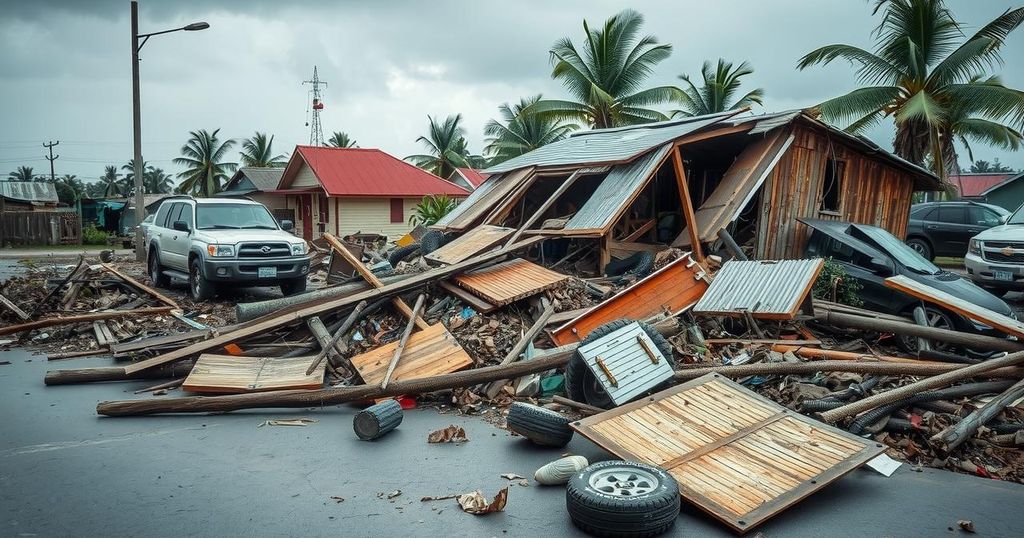Cyclone Chido: A Tragic Toll in Mozambique as Recovery Efforts Begin

Cyclone Chido has killed 94 people and injured 768 in Mozambique since hitting on December 15, impacting over 622,000 individuals. It caused major disruptions to health and education sectors, with significant damages reported. The government is mobilizing support for recovery efforts amidst ongoing challenges in Mayotte, where similar devastation occurred.
Cyclone Chido has tragically claimed the lives of 94 individuals in Mozambique, according to the National Institute of Risk and Disaster Management (INGD). The cyclone, which struck on December 15, 2023, with wind speeds reaching 260 km/h (160 mph) and unleashing 250 mm of rain in just 24 hours, has left approximately 768 people injured and more than 622,000 affected throughout the country. The cyclone initially impacted the French territory of Mayotte before continuing its destructive path through Mozambique, Malawi, and Zimbabwe.
The storm primarily affected northern provinces in Mozambique, including Cabo Delgado, Niassa, and Nampula—areas frequently exposed to cyclonic activity. In the aftermath, the INGD reported significant disruptions to education and health services, with over 109,793 students affected and numerous school facilities damaged. Additionally, 52 health units have sustained damage, exacerbating the already limited access to medical care in these regions.
In response to the devastation, Daniel Chapo, leader of the ruling party in Mozambique, emphasized that the government is mobilizing support at all levels to assist those affected in the provinces of Mecúfi, Nampula, Memba, and Niassa. During his visit to the hard-hit Cabo Delgado region, he affirmed the government’s collaboration with the INGD in rebuilding efforts.
Cyclone Chido was also devastating in Mayotte, marking the worst storm in 90 years and resulting in at least 35 documented fatalities there, with potential for that toll to rise significantly as assessments continue. To support recovery efforts, over 1,300 officers have been deployed, while daily deliveries of essential supplies, including food and water, are ongoing to address the immediate needs of the local population.
This incident underscores the vulnerability of regions to extreme weather phenomena, particularly in the face of climate change. The INGD highlighted the importance of resilient infrastructure and planning to mitigate future risks associated with tropical cyclones. While it remains complex to attribute specific storms to climate change, the Intergovernmental Panel on Climate Change (IPCC) indicates a strong correlation between human activity and increases in cyclone intensity and precipitation levels.
Tropical cyclones represent severe meteorological events characterized by high wind speeds, extensive rainfall, and storm surges—phenomena that frequently lead to substantial infrastructural damage and flooding. As global temperatures rise, these storms are expected to become more intense, posing further risks to vulnerable regions. The link between human-induced climate change and the exacerbation of tropical cyclones is supported by research from the IPCC, suggesting a concerning trend regarding future climatic events. The recent impact of Cyclone Chido in regions already struggling with socio-economic challenges reveals the urgent need for effective disaster preparedness and sustainable infrastructure development to minimize the effects of such natural disasters.
The devastation caused by Cyclone Chido in Mozambique, which resulted in 94 fatalities and widespread injuries, highlights the dire consequences of tropical cyclones exacerbated by climate change. As the government mobilizes resources for recovery, the incident serves as a crucial reminder of the need for resilient infrastructure and comprehensive disaster management strategies in vulnerable regions. Continued assessments following such natural disasters will be essential to properly allocate resources and support long-term recovery efforts.
Original Source: www.bbc.com







